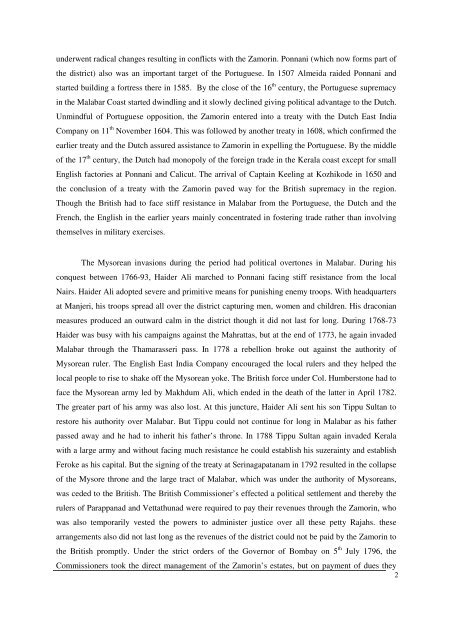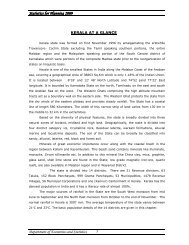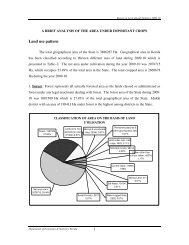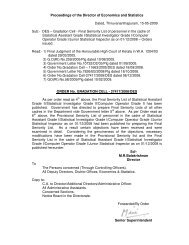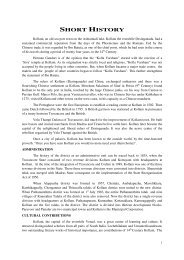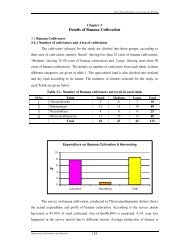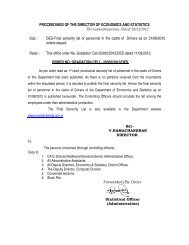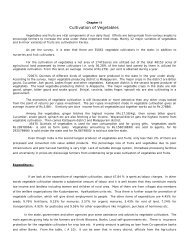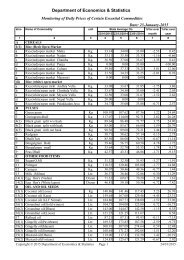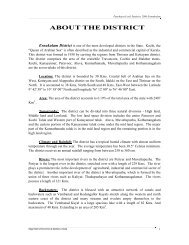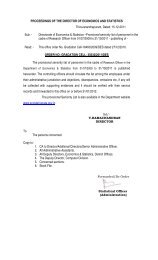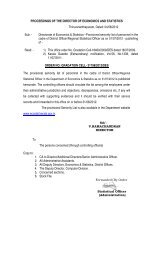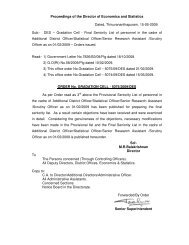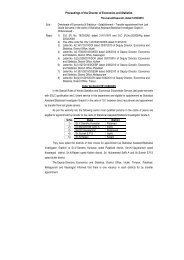BRIEF HISTORY - Government of Kerala
BRIEF HISTORY - Government of Kerala
BRIEF HISTORY - Government of Kerala
Create successful ePaper yourself
Turn your PDF publications into a flip-book with our unique Google optimized e-Paper software.
underwent radical changes resulting in conflicts with the Zamorin. Ponnani (which now forms part <strong>of</strong><br />
the district) also was an important target <strong>of</strong> the Portuguese. In 1507 Almeida raided Ponnani and<br />
started building a fortress there in 1585. By the close <strong>of</strong> the 16 th century, the Portuguese supremacy<br />
in the Malabar Coast started dwindling and it slowly declined giving political advantage to the Dutch.<br />
Unmindful <strong>of</strong> Portuguese opposition, the Zamorin entered into a treaty with the Dutch East India<br />
Company on 11 th November 1604. This was followed by another treaty in 1608, which confirmed the<br />
earlier treaty and the Dutch assured assistance to Zamorin in expelling the Portuguese. By the middle<br />
<strong>of</strong> the 17 th century, the Dutch had monopoly <strong>of</strong> the foreign trade in the <strong>Kerala</strong> coast except for small<br />
English factories at Ponnani and Calicut. The arrival <strong>of</strong> Captain Keeling at Kozhikode in 1650 and<br />
the conclusion <strong>of</strong> a treaty with the Zamorin paved way for the British supremacy in the region.<br />
Though the British had to face stiff resistance in Malabar from the Portuguese, the Dutch and the<br />
French, the English in the earlier years mainly concentrated in fostering trade rather than involving<br />
themselves in military exercises.<br />
The Mysorean invasions during the period had political overtones in Malabar. During his<br />
conquest between 1766-93, Haider Ali marched to Ponnani facing stiff resistance from the local<br />
Nairs. Haider Ali adopted severe and primitive means for punishing enemy troops. With headquarters<br />
at Manjeri, his troops spread all over the district capturing men, women and children. His draconian<br />
measures produced an outward calm in the district though it did not last for long. During 1768-73<br />
Haider was busy with his campaigns against the Mahrattas, but at the end <strong>of</strong> 1773, he again invaded<br />
Malabar through the Thamarasseri pass. In 1778 a rebellion broke out against the authority <strong>of</strong><br />
Mysorean ruler. The English East India Company encouraged the local rulers and they helped the<br />
local people to rise to shake <strong>of</strong>f the Mysorean yoke. The British force under Col. Humberstone had to<br />
face the Mysorean army led by Makhdum Ali, which ended in the death <strong>of</strong> the latter in April 1782.<br />
The greater part <strong>of</strong> his army was also lost. At this juncture, Haider Ali sent his son Tippu Sultan to<br />
restore his authority over Malabar. But Tippu could not continue for long in Malabar as his father<br />
passed away and he had to inherit his father’s throne. In 1788 Tippu Sultan again invaded <strong>Kerala</strong><br />
with a large army and without facing much resistance he could establish his suzerainty and establish<br />
Feroke as his capital. But the signing <strong>of</strong> the treaty at Serinagapatanam in 1792 resulted in the collapse<br />
<strong>of</strong> the Mysore throne and the large tract <strong>of</strong> Malabar, which was under the authority <strong>of</strong> Mysoreans,<br />
was ceded to the British. The British Commissioner’s effected a political settlement and thereby the<br />
rulers <strong>of</strong> Parappanad and Vettathunad were required to pay their revenues through the Zamorin, who<br />
was also temporarily vested the powers to administer justice over all these petty Rajahs. these<br />
arrangements also did not last long as the revenues <strong>of</strong> the district could not be paid by the Zamorin to<br />
the British promptly. Under the strict orders <strong>of</strong> the Governor <strong>of</strong> Bombay on 5 th July 1796, the<br />
Commissioners took the direct management <strong>of</strong> the Zamorin’s estates, but on payment <strong>of</strong> dues they<br />
2


